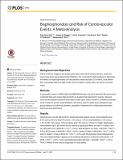| dc.contributor.author | Kim, Dae Hyun | en_US |
| dc.contributor.author | Rogers, James R. | en_US |
| dc.contributor.author | Fulchino, Lisa A. | en_US |
| dc.contributor.author | Kim, Caroline A. | en_US |
| dc.contributor.author | Solomon, Daniel H. | en_US |
| dc.contributor.author | Kim, Seoyoung C. | en_US |
| dc.date.accessioned | 2015-05-04T15:25:58Z | |
| dc.date.issued | 2015 | en_US |
| dc.identifier.citation | Kim, Dae Hyun, James R. Rogers, Lisa A. Fulchino, Caroline A. Kim, Daniel H. Solomon, and Seoyoung C. Kim. 2015. “Bisphosphonates and Risk of Cardiovascular Events: A Meta-Analysis.” PLoS ONE 10 (4): e0122646. doi:10.1371/journal.pone.0122646. http://dx.doi.org/10.1371/journal.pone.0122646. | en |
| dc.identifier.issn | 1932-6203 | en |
| dc.identifier.uri | http://nrs.harvard.edu/urn-3:HUL.InstRepos:15034798 | |
| dc.description.abstract | Background and Objectives Some evidence suggests that bisphosphonates may reduce atherosclerosis, while concerns have been raised about atrial fibrillation. We conducted a meta-analysis to determine the effects of bisphosphonates on total adverse cardiovascular (CV) events, atrial fibrillation, myocardial infarction (MI), stroke, and CV death in adults with or at risk for low bone mass. Methods: A systematic search of MEDLINE and EMBASE through July 2014 identified 58 randomized controlled trials with longer than 6 months in duration that reported CV events. Absolute risks and the Mantel-Haenszel fixed-effects odds ratios (ORs) and 95% confidence intervals (CIs) of total CV events, atrial fibrillation, MI, stroke, and CV death were estimated. Subgroup analyses by follow-up duration, population characteristics, bisphosphonate types, and route were performed. Results: Absolute risks over 25–36 months in bisphosphonate-treated versus control patients were 6.5% versus 6.2% for total CV events; 1.4% versus 1.5% for atrial fibrillation; 1.0% versus 1.2% for MI; 1.6% versus 1.9% for stroke; and 1.5% versus 1.4% for CV death. Bisphosphonate treatment up to 36 months did not have any significant effects on total CV events (14 trials; ORs [95% CI]: 0.98 [0.84–1.14]; I2 = 0.0%), atrial fibrillation (41 trials; 1.08 [0.92–1.25]; I2 = 0.0%), MI (10 trials; 0.96 [0.69–1.34]; I2 = 0.0%), stroke (10 trials; 0.99 [0.82–1.19]; I2 = 5.8%), and CV death (14 trials; 0.88 [0.72–1.07]; I2 = 0.0%) with little between-study heterogeneity. The risk of atrial fibrillation appears to be modestly elevated for zoledronic acid (6 trials; 1.24 [0.96–1.61]; I2 = 0.0%), not for oral bisphosphonates (26 trials; 1.02 [0.83–1.24]; I2 = 0.0%). The CV effects did not vary by subgroups or study quality. Conclusions: Bisphosphonates do not have beneficial or harmful effects on atherosclerotic CV events, but zoledronic acid may modestly increase the risk of atrial fibrillation. Given the large reduction in fractures with bisphosphonates, changes in osteoporosis treatment decision due to CV risk are not justified. | en |
| dc.language.iso | en_US | en |
| dc.publisher | Public Library of Science | en |
| dc.relation.isversionof | doi:10.1371/journal.pone.0122646 | en |
| dc.relation.hasversion | http://www.ncbi.nlm.nih.gov/pmc/articles/PMC4401508/pdf/ | en |
| dash.license | LAA | en_US |
| dc.title | Bisphosphonates and Risk of Cardiovascular Events: A Meta-Analysis | en |
| dc.type | Journal Article | en_US |
| dc.description.version | Version of Record | en |
| dc.relation.journal | PLoS ONE | en |
| dash.depositing.author | Kim, Caroline A. | en_US |
| dc.date.available | 2015-05-04T15:25:58Z | |
| dc.identifier.doi | 10.1371/journal.pone.0122646 | * |
| dash.authorsordered | false | |
| dash.contributor.affiliated | Kim, Caroline A. | |
| dash.contributor.affiliated | Kim, Seoyoung | |
| dash.contributor.affiliated | Solomon, Daniel | |


